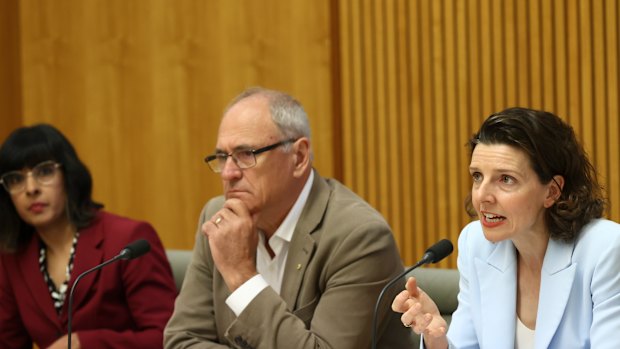Low inflation and official interest rates through the 2010s, then COVID, the post-pandemic inflation explosion, Russia’s invasion of Ukraine, and more recently the war in Gaza all diverted attention away from the productivity slowdown.
But with inflation subsiding and Donald Trump upending the global trading order, most governments – including the freshly re-elected administration of Anthony Albanese – are revisiting ways to get their economies back to health.
Treasurer Jim Chalmers, who will sit through all roundtable sessions, and whose department will be driving much of the analysis of the various proposals put up by participants, has cautioned that those looking for instant results on Thursday evening will be disappointed.
“[The point of] this economic reform roundtable is not to make decisions, it’s to inform the government’s decisions,” Chalmers told ABC Radio National Breakfast on Wednesday. “And that’s the point that we have made all along.”
The roundtable has attracted almost 900 submissions, although some proposals appear dead on arrival. There seems little appetite, for instance, to support the ACTU’s ambit claim for a four-day working week without a cut in pay.
Loading
The Productivity Commission has, through five papers canvassing everything from tax to AI, made more than 40 separate recommendations of its own.
The government has held a series of industry-specific roundtables in areas such as mining, agriculture and housing, where a host of ideas has surfaced. Chalmers sat down with business leaders and lobby groups ahead of the roundtable, as have other ministers.
“I think it has been a very worthwhile thing that we are shaking the tree for ideas, and the prime minister and I are aligned in the way we go about that,” Chalmers told Ratio National.
The reason for so many ideas bubbling up is twofold. The first is that it has been a long, long time since a government has asked all and sundry to produce a shopping list of suggestions.
The second is that there is no single bullet solution to a productivity problem that has afflicted every nation and almost every corner of the economy.
In housing, for instance, the average time in Australia to complete a block of apartments has soared since 2008 from around 17 months to 28 months. Building a house has increased from seven months to 10.
But in comparison to other countries, the Australian construction sector is almost a beacon of hope. The Productivity Commission found building productivity in Australia is outperforming the US, Britain and Sweden.
Explaining its reason for lowering its productivity assumption, the Reserve Bank suggested a number of reasons.
They include declining dynamism among businesses and across the labour market, slower rollout of technological breakthroughs, falling competition, regulatory red tape, a slowdown in the growth of skills among workers, and a drop in trade linkages across the world.
Even measuring productivity can be difficult.
Some pundits have blamed the increase in financial resources and people in the care sectors of the economy (aged care, childcare, health, disability) for the slowdown in productivity.
Measuring productivity in these sectors, where relatively low-paid people provide intense services to the frail, sick, old or young, is notoriously difficult.
The Productivity Commission this week reported that by a traditional measure of productivity, it had grown at just 0.1 per cent a year across the nation’s hospitals between 2008-09 and 2018-19. By contrast, productivity across the entire economy grew by 0.7 per cent per annum.

Health outcomes have sharply improved over the past 30 years, but this has not been captured in official measures of productivity.
Yet that doesn’t consider the huge improvements in the quality of care or patient outcomes. Cancer treatments, the commission said, are far more effective today than they were a few years ago.
When you account for quality, healthcare productivity grew at 3 per cent per year through much of the past decade, dwarfing the rest of the economy.
“Simply put, Australians are getting better outcomes, but not necessarily more care services, per dollar spent,” the commission noted.
Loading
Another issue is that productivity in the mining sector – the nation’s most productive based on the value of its outputs – has fallen off a cliff over the past five years. It has tumbled by 20 per cent, largely because miners are now tapping lower-value deposits while facing a string of natural disasters that have flooded coal mines or shut down key production sites.
No matter the varied causes, it’s clear the government and most participants want to target a productivity bugbear: red tape and bureaucracy.
The battle to get bike helmets into the economy is a small-scale example.
While the nation’s cyclists protect their heads with imported helmets, the safety standards governing the headwear differs. It costs importers about $14 million a year to comply with those different standards.
Loading
The Australian Competition and Consumer Commission started a process to align the European and American standards governing helmets sold domestically in 2016. It was only completed last year, but it has yet to be signed off by all states and territories.
“The net result is that eight years after realising the value of harmonisation, most Australians are yet to see benefits,” the Productivity Commission reported earlier this month.
Productivity is not just red tape or new machines or tax. The skills of the workforce are also a vital component.
The Smith Family says there are 3.3 million people living in poverty in Australia, including 761,000 children.
Loading
It’s pinning its hopes on the roundtable coming up with ways to lift school completion rates and overall education outcomes, given their strong connection to improved wages and incomes.
“We know children and young people from disadvantaged backgrounds are more susceptible to falling behind in the classroom, disengaging with school, not finishing year 12 and not being able to fully participate in the workforce,” the charity’s chief executive officer, Doug Taylor, says.
“To boost the pool of talent in the nation’s workforce, we must plug the holes to stop students experiencing disadvantage from falling through the cracks.”
Despite the reticence of the government to deal with the multitude of issues with the nation’s tax system, many people believe the purpose of next week is to put tax reform squarely at the centre of Anthony Albanese’s second-term agenda.
Independent MP Allegra Spender, who has a seat at the roundtable, is looking for a shift to a dual income tax system. Investors would lose the ability to offset their taxable income through losses on their property holdings, with the revenue used to reduce personal income tax rates.

Allegra Spender (right), Ken Henry and Grattan Institute head Aruna Sathanapally (left) will be at next week’s economic roundtable.Credit: Dominic Lorrimer
“You should be rewarded for investing in yourself, not for expanding your property portfolio,” she said.
Ben Phillips, from the ANU’s Centre for Social Policy Research, has proposed a major simplification of the entire system that includes axing the Medicare levy and the low-income tax offset, removing Family Tax Benefit B (while substantially lifting Family Tax Benefit A), and making changes to JobSeeker and the parenting payment.
He says that over the years, the tax and welfare system has been subject to changes that often appear ad hoc, politically motivated or driven by short-term budget goals.
“Many of these changes lack a clear rationale and, arguably, are unnecessary and have themselves added to complexity,” he says.
From family payments to suburban housing blocks to helmet standards, productivity – and its slowdown – permeates the economy.
Without any concrete proposals out of next week, Michele Bullock will be joined by a prime minister and treasurer with concern etched on their collective faces.
Cut through the noise of federal politics with news, views and expert analysis. Subscribers can sign up to our weekly Inside Politics newsletter.

